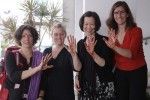Faculty Travels to India Over Winter Break to Advance Core Curriculum

Once students left Colgate’s campus for winter break, the temperatures dropped and snow began to fall in Hamilton. 27 faculty members were not there to experience the cold. Instead in early January, they boarded a plane and traveled to sunny India for a two-week long academic enlightening experience.
The tradition of Colgate faculty travel began in 1986 when a faculty group traveled to Manchester, England, which helped inspire the first Challenges of Modernity course, a staple of the Colgate Core curriculum. Other Core development trips occurred in 1998 when faculty traveled to Rome and in 2002 with a trip to Spain. The Freeman Foundation also supported trips in 2004, 2005 and 2008 to East Asia. This year’s India trip ran using a grant from the Andrew W. Mellon Foundation.
“Knowing that President Jeffrey Herbst has a strong commitment to internationalization, the University professors and I proposed that he consider supporting a faculty development trip to India. He very generously decided to do so, in part by using a Mellon grant that is given to college presidents in their second year to support projects of significant interest,” Christian A. Johnson Endeavor Chair in Liberal Arts Studies and Professor of English and Director of the Division of University Studies Constance Harsh said.
Faculty suggested several locations, but India was ultimately chosen because Associate Professor of Art and Art History and Asian Studies Padma Kaimal and Associate Professor of Religion Eliza Kent could lead and contribute their scholarly expertise. Once the location had been chosen, faculty were invited to fill out applications. Decisions were based on whether or not professors would be able to make a commitment to teaching the Core curriculum classes in the future.
The India experience differed for each participant based on his or her area of expertise. Professors from many disciplines were present on this trip, such as biology, Jewish studies, religion, political science, psychology, etc. Some focused on the architectural design, while others discussed their interactions with locals and interpretations of the culture. Among the cities they visited in the two-week period were Jaipur, Delhi and Agra.
“One of my most indelible memories is our visit to the Surya Mandir Temple on the outskirts of Jaipur. We happened upon a festival that involved providing a free meal to anyone who came by. There was a wonderful spirit of friendliness and generosity in the people who were taking part,” Professor Harsh said.
Faculty have already begun conversation about how to change Challenges of Modernity (Core 152) in light of their India experiences. This trip will help professors shed light on the new Core curriculum theme, “Crossing Boundaries,” and will also help with the development of the fledgling Global Engagements requirement that students must complete before graduation.
“While this expedition was conceived of with the Core primarily in mind, I would expect that it would also have an effect on many people’s teaching in their own disciplines. I think that most people are still processing their experiences…this was a remarkable experience for all of us. I think that its long-term effect will be measured not only in terms of what material we add to our courses but how we help our students think about the interconnected world in which we live. In India we gained knowledge, but we also reshaped our perspective on the world,” Harsh said.
More information about the faculty trip can be found on the Colgate website or the faculty blog, “Reflections From India.”
Contact Morgan Giordano at [email protected].






